2016 年重庆合川中考英语真题及答案 B 卷
第 I 卷(共 100 分)
I.听力测试。(共 30 分)
第一节(每小题 1.5 分,共 9 分)
听一遍。根据你所听到的句子,从 A、B、C 三个选项中选出最恰当的答语,并把答题卡上对
应题目的答案标号涂黑。
1. A. Good morning!
B. Good afternoon!
C. Good evening!
2. A. It’s 8:10.
B. It’s June 14th.
C. It’s a fine day.
3. A. Excuse me.
B. That’s OK.
C. Thank you.
4. A. No, I’m not.
B. Sorry, I won’t.
C. Don’t mention it.
5. A. See you.
B. Please don’t.
C. That’s right.
6. A. Yes, please.
B. Sure, I’d love to.
C. You’re welcome.
第二节(每小题 1.5 分,共 9 分)
听一遍。根据你所听到的对话和问题,从 A、B、C 三个选项中选出正确答案,并把答题卡上
对应题目的答案标号涂黑。
7. A. Windy.
B. Snowy.
C. Sunny.
8. A. At seven.
B. At eight.
C. At nine.
9. A. Kate.
10. A. Noisy.
B. Jeff.
B. Soft.
C. Tony.
C. Quiet.
11. A. Meat.
B. Fruit.
C. Vegetables.
12. A. By bus.
B. By bike.
C. On foot.
第三节(每小题 1.5 分,共 6 分)
听两遍。根据你所听到的长对话,从 A、B、C 三个选项中选出正确答案,并把答题卡上对应
题目的答案标号涂黑。
听下面一段材料,回答第 13 和 14 小题。
13. Where are the speakers?
A. At home.
B. In the hotel.
C. In a store.
14. What would the man like to do?
A. To take photos.
B. To buy a gift.
C. To talk with friends.
1
�
听下面一段材料,回答第 15 和 16 小题。
15. What is on show in the library?
A. Chinese stamps.
B. British movies.
C. Science books.
16. When does Betty want to go to the library?
A. On Sunday morning.
B. On Sunday afternoon.
C. On Saturday
afternoon.
第四节(每小题 1.5 分,共 6 分)
听两遍。根据你所听到的短文内容,从 A、B、C 三个选项中选出正确答案,并把答题卡上对
应题目的答案标号涂黑。
17. Mrs. Smith lost her son when she was ________.
A. doing some shopping
B. calling the office
C. taking a walk
18. The boy is thin and has a round face with _______ hair.
A. brown
B. black
C. yellow
19. There is a picture of Micken Mouse on the boy’s ________.
A. T-shirt
B. pants
C. coat
20. If you see the boy, you can call Mrs. Smith at _________.
A. 109-6321
B. 321-6091
C. 632-1091
II. 单项选择。(每小题 1 分,共 20 分)
从 A、B、C、D 四个选项中选出可以填入空白处的最佳答案,并把答题卡上对应题目的
答案标号涂黑。
21. Ciqikou is _______ famous place in Chongqing.
A. a
B. an
C. the
D. /
22. Jim lives _____ a small village and the air there is very fresh.
A. on
B. in
C. under
D. from
23. To my surprise, he sold ______ house at such a low price.
A. he
B. him
C. his
D. himself
24. I can’t hear you ______. Please speak a little louder.
A. clearly
B. lovely
C. widely
D. friendly
25. It’s cold today. Take your ______ with you when you go out.
A. knife
B. coat
C. brush
D. key
2
�
26. I _____ Chinese dishes for my foreign friends tomorrow evening.
A. will cook
B. have cooked
C. cook
D. cooked
27. --- TuYouyou has won the Nobel Prize.
--- ______ great she is! We Chinese are so proud of her.
A. What a
B. What
C. How a
D. How
28. --- Jack, don’t always copy what others do. ______ your head, please.
--- Thanks for telling me.
A. Using
B. Used
C. Uses
D. Use
29. I’m sorry I know _____ about it. It’s a secret between them.
A. nothing
B. something
C. anything
D. everything
30. You must be more careful and _____ the same mistakes you’ve ever made.
A. plan
B. follow
C. avoid
D. enjoy
31. --- This kind of watch is much _____ today than last month. Would you like to
have one?
--- Really? I’ll take one.
A. the most expensive
B. the cheapest
C. more expensive
D. cheaper
32. --- It’s getting dark. Could you please ____ the light for me?
--- All right. Just a minute.
A. keep on
B. turn on
C. try on
D. put on
33. Taijiis my favorite and I often play it ______ healthy.
A. to keep
B. keeps
C. keeping
D. kept
34. --- Maybe you can catch the last bus.
--- _______. If not, I’ll have to walk home.
A. Good job
B. Just so-so
C. Not at all
D. I hope so
35. He _____ speak English very well although he has studied it for only one year.
A. mustn’t
B. can’t
C. must
D. can
36. The environment here becomes better and better. ______ birds are coming back.
A. Thousands of
B. Thousand of
C. Thousands
D. Thousand
37. --- Mom, where is my model plane?
--- Oh, it ______ to Jenny yesterday.
3
�
A. is lent
B. lends
C. was lent
D. lent
38. Our Chinese teacher didn’t go to bed ______ he finished his work last night.
A. if
B. until
C. since
D. because
39. --- I’m feeling terrible! I have a bad cold.
--- ______. You’d better see a doctor at once.
A. I’m afraid not
B. Sorry to hear that
C. Sounds great
D. You are
right
40. --- I like Super Brain very much. Do you know ______ on show?
--- At 10:00 every Friday evening. It’s a good program to make science popular.
A. where it is
B. where is it
C. when it is
D. when is it
III. 完形填空。(每小题 1.5 分,共 15 分)
根据短文内容,从 A、B、C、D 四个选项中选出一个能填入相应空格内的最佳答案,并把答
题卡上对应题目的答案标号涂黑。
In a history class, our teacher, Mrs. Bartlett asked us to make a poster (海
报) in groups about the culture that we were studying. She told us to write the names
of three friends we wanted in one group and she would think about our __41___.
The next day, I was told to be in a group I would __42__ want ---the boy who
was too weak in English, and the two girls who wore strange clothes. Oh, how I wanted
to be with my __43__!
With tears in my eyes, I walked up to Mrs. Bartlett. She __44__ me and seemed
to know what I was there for. I told her I should be in the “good” group. She gently
(轻轻地) __45___ a hand on my shoulder (肩膀). “I know what you want, Karma,” she
said, “but your group needs you. I need you to help them. Only you can help them.”
I was __46__ and moved. Her words encouraged me.
“Will you help them?” she asked. “Yes,” I replied. Then I __47__ walked over
to my group. I sat down and we started. Each of us did a part according to our interests.
Halfway through the week, I felt __48__ enjoying our group. We did a good job together.
My group members weren’t thought to be good just because no one cared enough about
them __49__ Mrs. Bartlett.
At last, our group got an A. But I think we should hand the A back to Mrs. Bartlett.
4
�
She was the one who should truly ___50___ it. Mrs. Bartlett brought out the potential
(潜能) in four of her students.
41. A. classes
B. books
C. choices
D. clothes
42. A. often
B. never
C. always
D. sometimes
43. A. boys B. girls
C. friends
D. teachers
44. A. laughed at
B. looked at
C. lived with
D. agreed with
45. A. placed
B. pushed
C. washed
D. pulled
46. A. useful
B. surprised
C. thirsty
D. asleep
47. A. hardly
B. deeply
C. lazily
D. bravely
48. A. myself
B. herself
C. yourself
D. himself
49. A. around
B. with
50. A. receive
B. start
C. for
C. give
D. except
D. throw
IV. 阅读理解。(每小题 2 分,共 30 分)
阅读下列材料,从 A、B、C、D 四个选项中选出最佳答案,并把答题卡上对应题目的答案标
号涂黑。
A
A man liked shooting arrows (箭). He studied it very hard for years. He thought
he did it best and it was time for him to go out into the world.
One day when he walked through a forest, he saw a target (靶子) on a tree, with
an arrow right in the center. He went on and found more and more trees with targets
and arrows in the center. He was so surprised at this. He wanted to know who did
it.
Soon he came to a farmhouse. An old man told him that he could find the person
he wanted by the river. When he got there, he saw a little girl playing with her
dog on the bank.
“Are you the person who shoots the arrows?” he asked the girl.
“Yes, that’s me,” she replied.
“But how can you do that?” he wondered.
“That’s easy,”said the girl happily.“First shoot an arrow.”Then draw a target.”
51. The man liked _____ and studied it hard for years.
5
�
A. fishing
B. jumping
C. shooting
D. drawing
52. The man was surprised to find many targets with ______ in the centers.
A. arrows
B. rivers
C. dogs
D. trees
53. ________ shot an arrow first and then drew a target.
A. The girl
B. The man
C. The old man
D. The farmer
B
Welcome to our idiom (习语) corner!
to feel very happy and excited (especially when
sth. good has happened)
e.g. Jenny is walking on air because her friend
invited her to the school dance. She can’t wait to
go.
an unknown person who enters a race and gets a
good grade
e.g. Did you hear about the dark horse in the running
race yesterday? It was his first race and he finished in
the top ten.
to act quickly, without thinking
e.g. I hate working with Mary. She’s quick on
the trigger and always ready to get mad.
to encourage sb. to do sth. (especiallysth. They
shouldn’t do)
e.g. When your classmate eggs you on to copy his
test paper, you should say “no” to him.
54. Picture _____ can be chosen to express “to do something without thinking”.
A
B
C
D
55. We can’t believe Robert won this watch. He’s really _______.
A. a walking man
B. a trigger
C. a dark horse
D. an egg
56. The Chinese meaning to the idiom “to walk on air” is probably “________”.
A. 一无所有
B.欢天喜地
C.愁眉苦脸
D.不假思索
6
�
57. The writer didn’t use _______ to help the readers understand the idioms above.
A. explanations (解释)
B. pictures
C. examples
D. results
C
A wild baby bison (野牛) at Yellowstone National Park had to be killed because
of tourists.
The tourists thought that the baby bison looked cold. They put it in their car
and drove to a park ranger (管理员) station.
A ranger described the action of the tourists as a “dangerous move” because
adult bisons can look after their babies very well and they will attack (攻击) to
protect their young.
Park rangers took the animal from the car and set it free. But, sadly, the baby
was refused by its family because it had the smell from humans.
Yellowstone National Park explained on Facebook that the smell from people can
cause parent animals to refuse to accept their young. The park tried again and again
to make the baby bison lives with its parents. After several times they had to give
up.
Many people expressed anger at both the tourists and the park.
The park said that they did not have the ability to care for a young bison.
They also said that it is “not the task of the park to save animals”.
The tourists were fined (罚款) $110 for touching park wildlife. Park rules say
that visitors to Yellowstone should stay at least 22 meters away from all wildlife,
and at least 90 meters away from bears and wolves.
One ranger said that Yellowstone recently added many safety signs that say
staying near the wildlife there is dangerous to humans and animals as well. Those
signs are written in English and other languages.
58. The tourists took the baby bison to a park ranger station because they thought
it looked ______.
A. sad
B. hungry
C. happy
D. cold
59. The park ranger described the action of the tourists as a “dangerous move”
because _______.
7
�
A. the tourists drove in a wrong way
B. adult bisons would attack the tourists
C. adult bisons couldn’t look after their baby well
D. the tourists would make the baby bison sick
60. Which of the following is TRUE according to the passage?
A. The park refused to send the baby bison back.
B. The visitors saved the baby bison.
C. Many people are angry at the bison family.
D. The smell from humans may bring trouble to bisons.
61. From the passage, we can learn that _________.
A. we must keep away from any wild animal
B. we should care about wild animals in a right way
C. we’ll be fined if we save a bison in the park
D. we’d better write safety signs in many languages
D
Many homes have cameras to protect them from danger. The cameras can tell the
owners if someone has entered. But the cameras do not know whether the person is
a family member, a friend, a postman or a criminal (罪犯).
But a new camera made by a French company can recognize (辨别出) faces. It can
tell parents at work that their children have returned from school, or that the mail
has been sent to their home. It can also tell them if a stranger has entered their
home. When family members enter a home, the smart camera “recognizes” them and
sends information to the owner’s phone. The owner can choose to see the video then
or later. But if an unknown person enters a home, the camera will send a warning
sound on the owner’s phone.
This is what happened recently to a smart home camera owner named Damien. He
lives in Paris.
“On a Friday I was at work, having a big monthly meeting when my phone moved.
At first I told myself ‘Oh, it must be a wrong warn,’ but my phone was telling
me there was a face that the camera did not recognize. Something was happening in
8
�
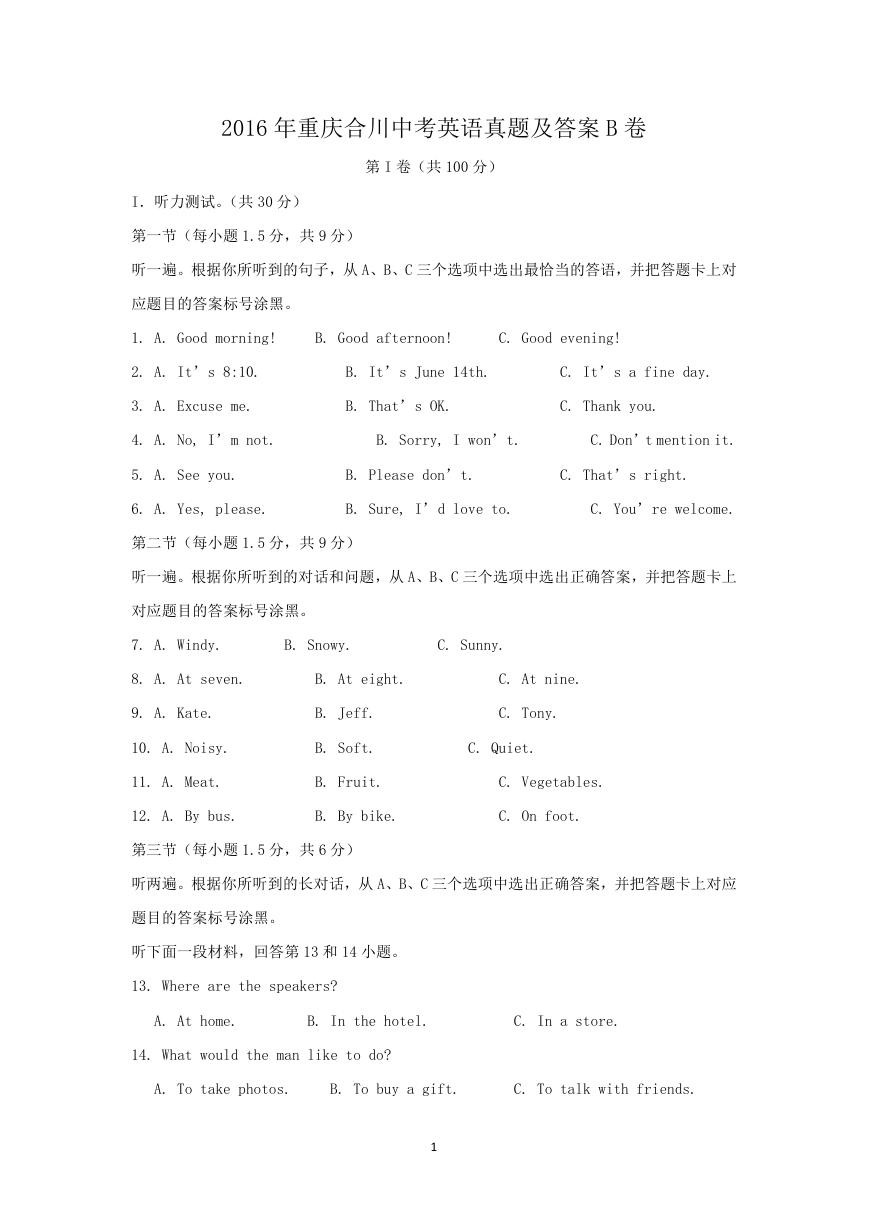
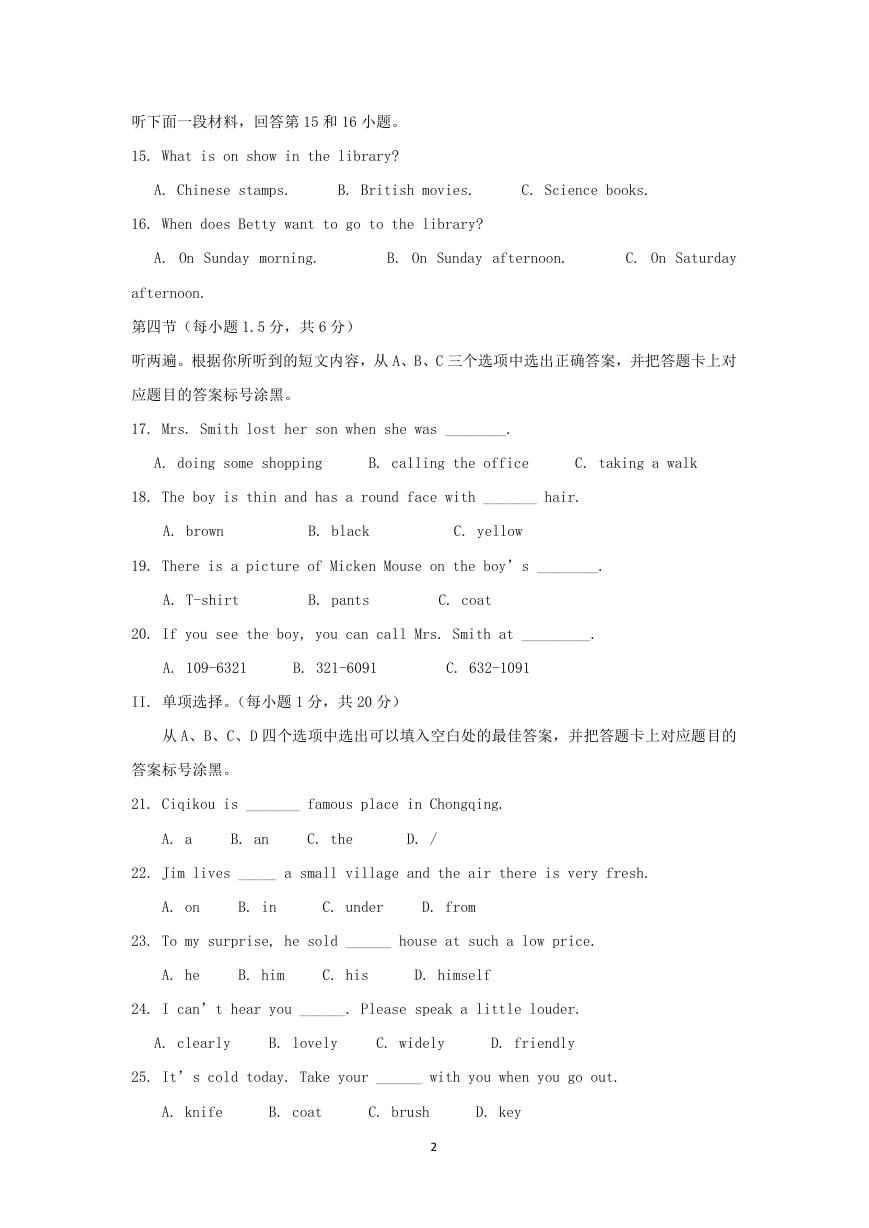
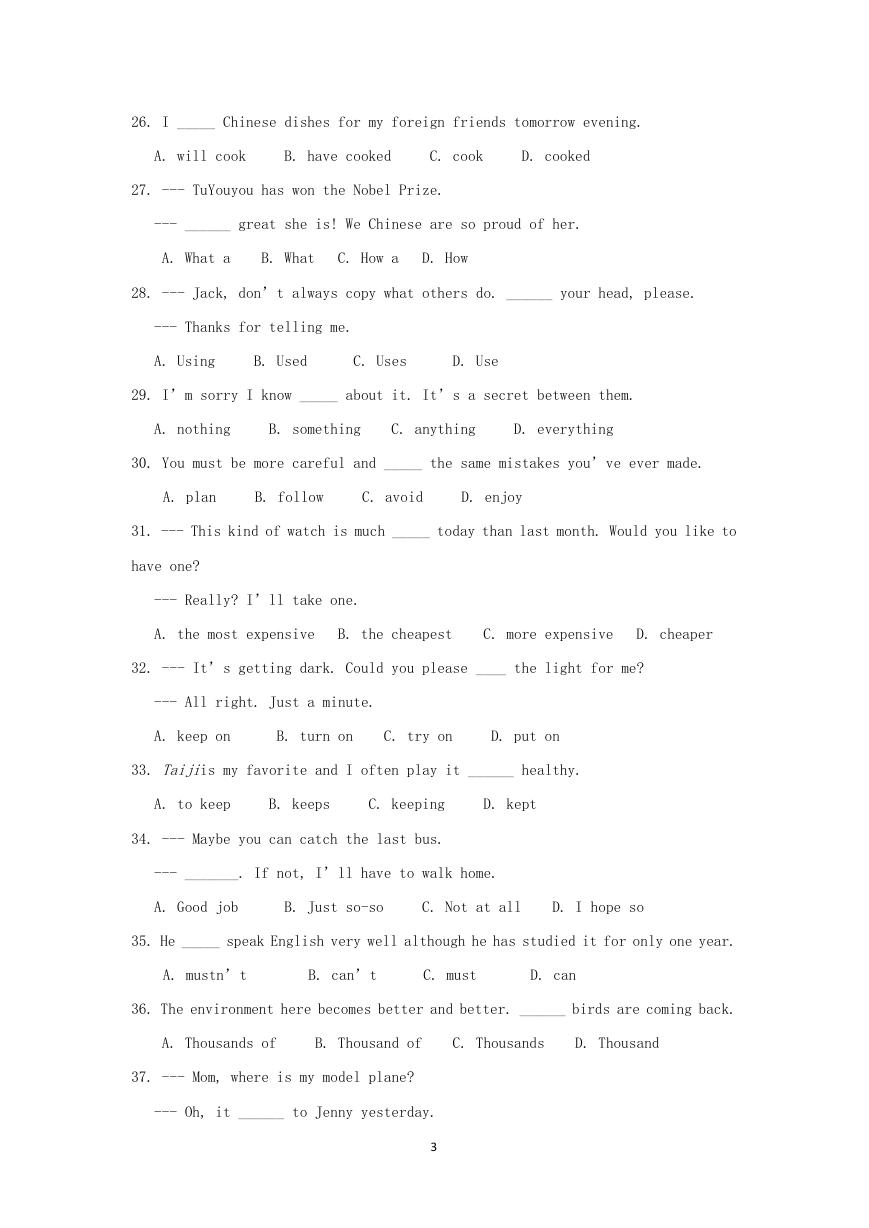
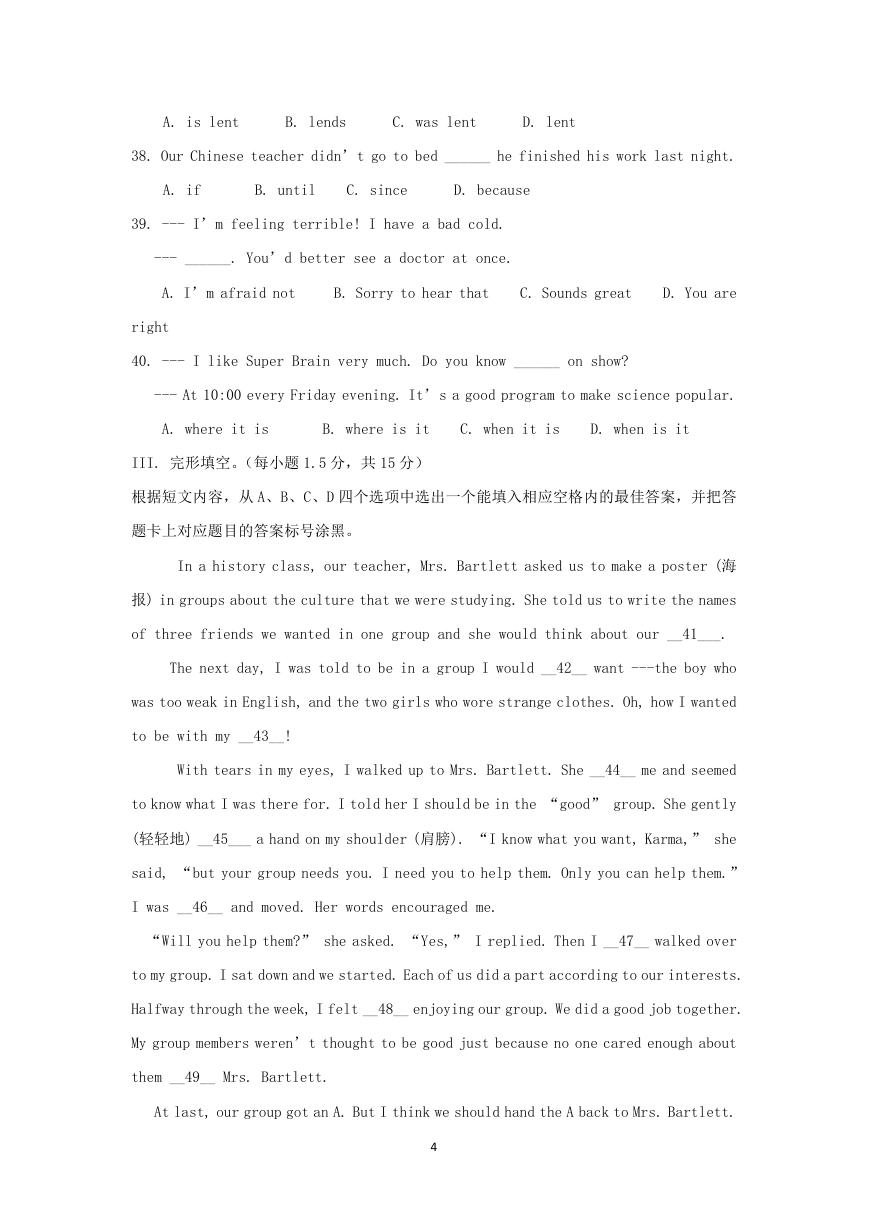
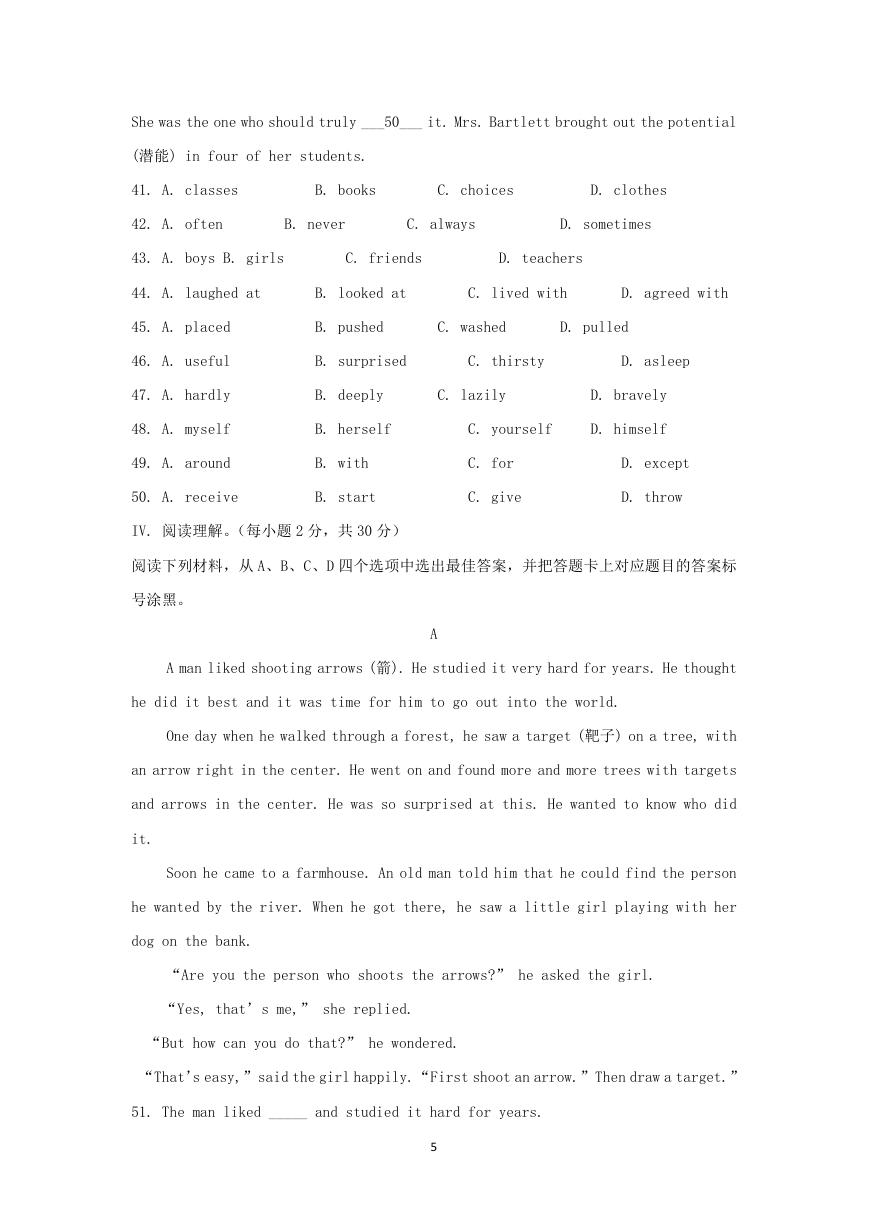
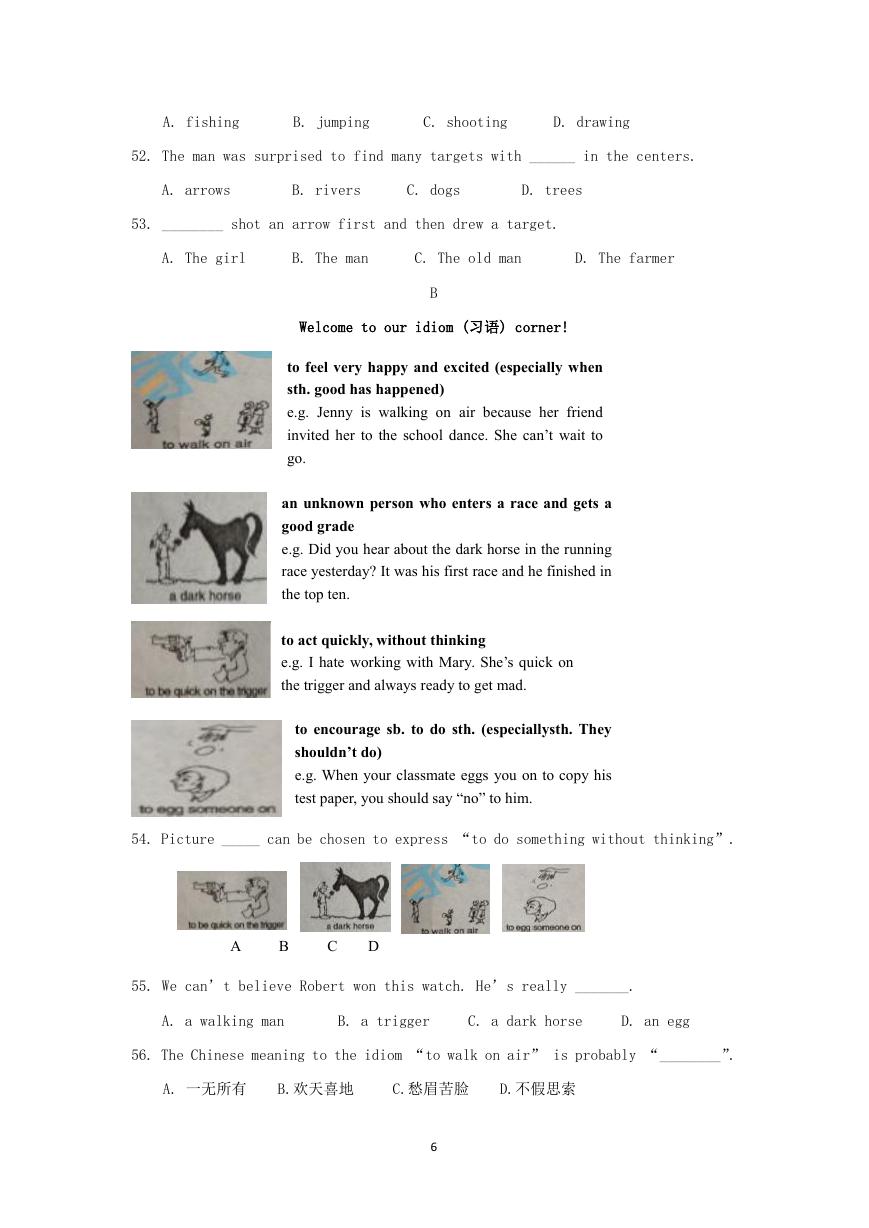
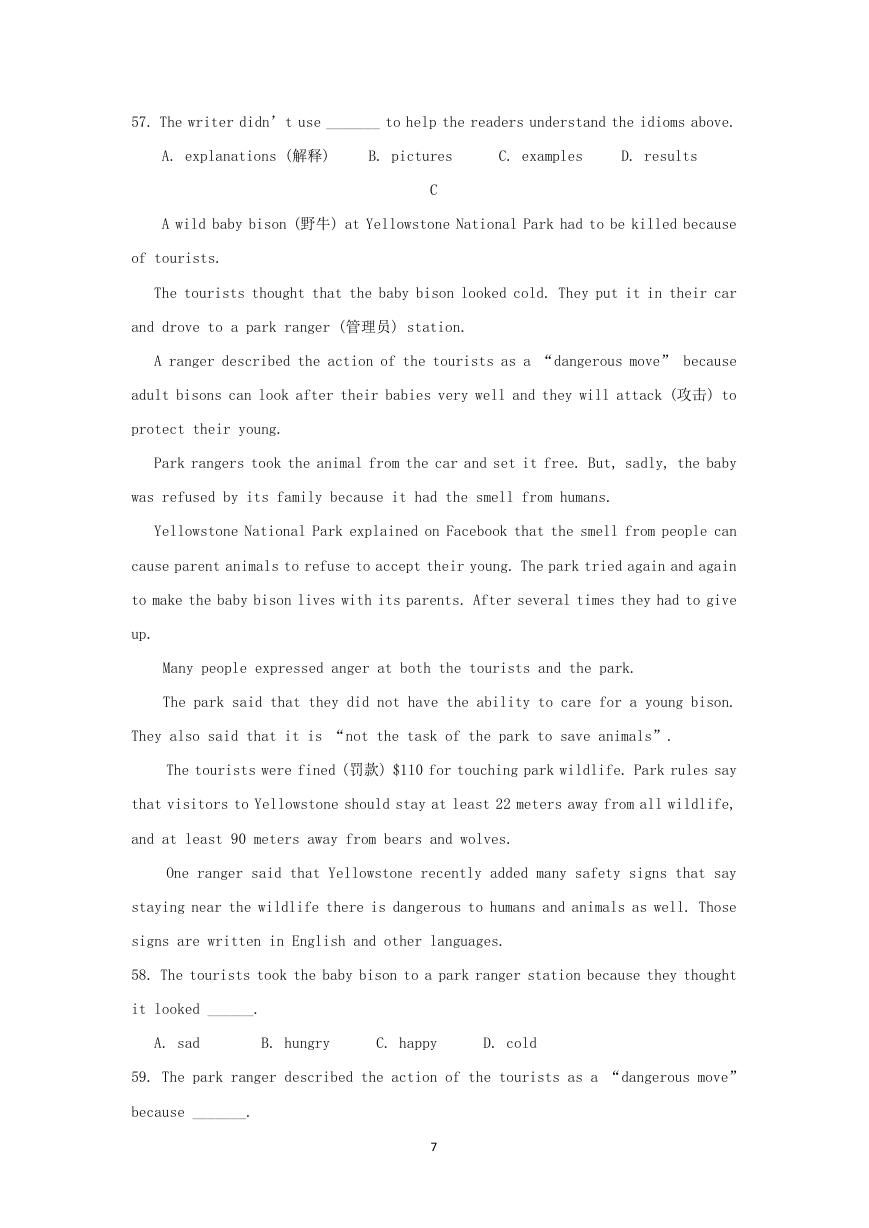
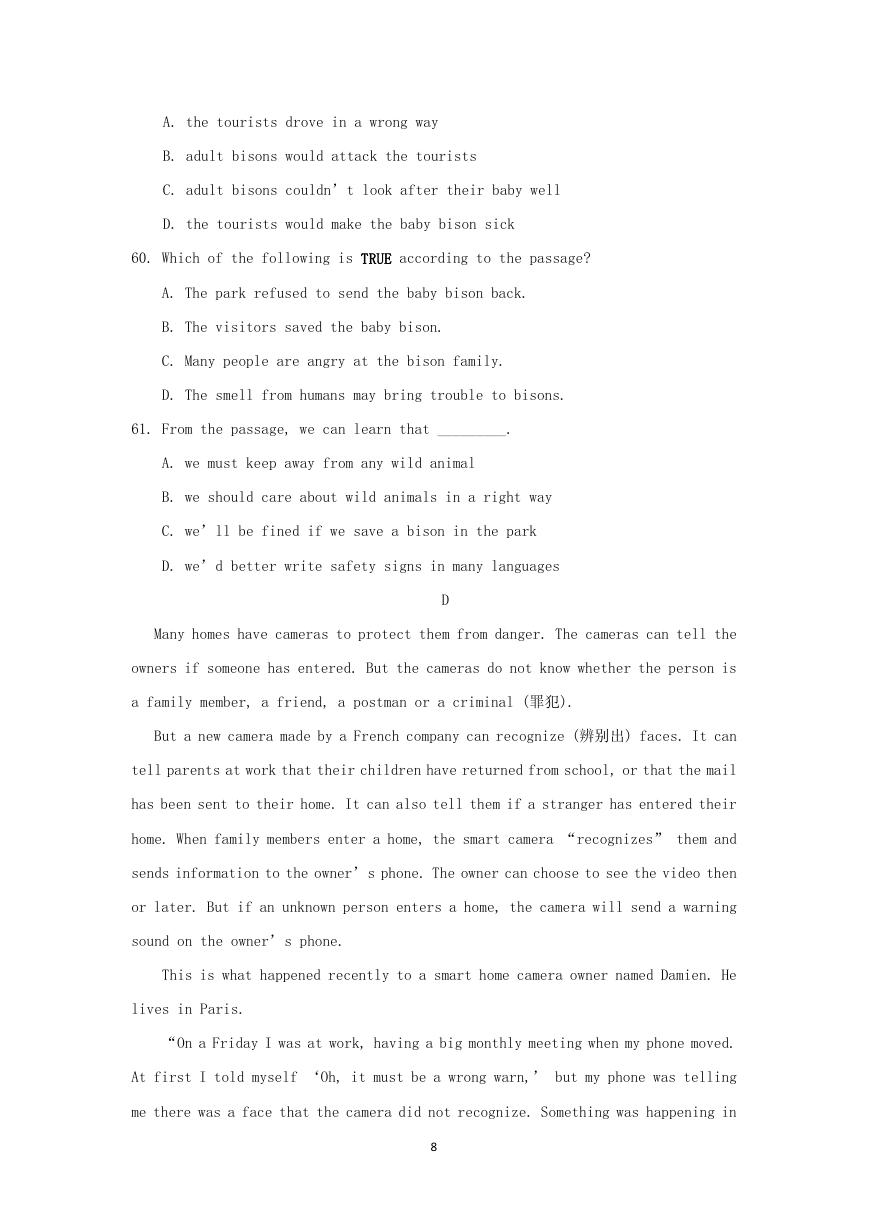








 2023年江西萍乡中考道德与法治真题及答案.doc
2023年江西萍乡中考道德与法治真题及答案.doc 2012年重庆南川中考生物真题及答案.doc
2012年重庆南川中考生物真题及答案.doc 2013年江西师范大学地理学综合及文艺理论基础考研真题.doc
2013年江西师范大学地理学综合及文艺理论基础考研真题.doc 2020年四川甘孜小升初语文真题及答案I卷.doc
2020年四川甘孜小升初语文真题及答案I卷.doc 2020年注册岩土工程师专业基础考试真题及答案.doc
2020年注册岩土工程师专业基础考试真题及答案.doc 2023-2024学年福建省厦门市九年级上学期数学月考试题及答案.doc
2023-2024学年福建省厦门市九年级上学期数学月考试题及答案.doc 2021-2022学年辽宁省沈阳市大东区九年级上学期语文期末试题及答案.doc
2021-2022学年辽宁省沈阳市大东区九年级上学期语文期末试题及答案.doc 2022-2023学年北京东城区初三第一学期物理期末试卷及答案.doc
2022-2023学年北京东城区初三第一学期物理期末试卷及答案.doc 2018上半年江西教师资格初中地理学科知识与教学能力真题及答案.doc
2018上半年江西教师资格初中地理学科知识与教学能力真题及答案.doc 2012年河北国家公务员申论考试真题及答案-省级.doc
2012年河北国家公务员申论考试真题及答案-省级.doc 2020-2021学年江苏省扬州市江都区邵樊片九年级上学期数学第一次质量检测试题及答案.doc
2020-2021学年江苏省扬州市江都区邵樊片九年级上学期数学第一次质量检测试题及答案.doc 2022下半年黑龙江教师资格证中学综合素质真题及答案.doc
2022下半年黑龙江教师资格证中学综合素质真题及答案.doc